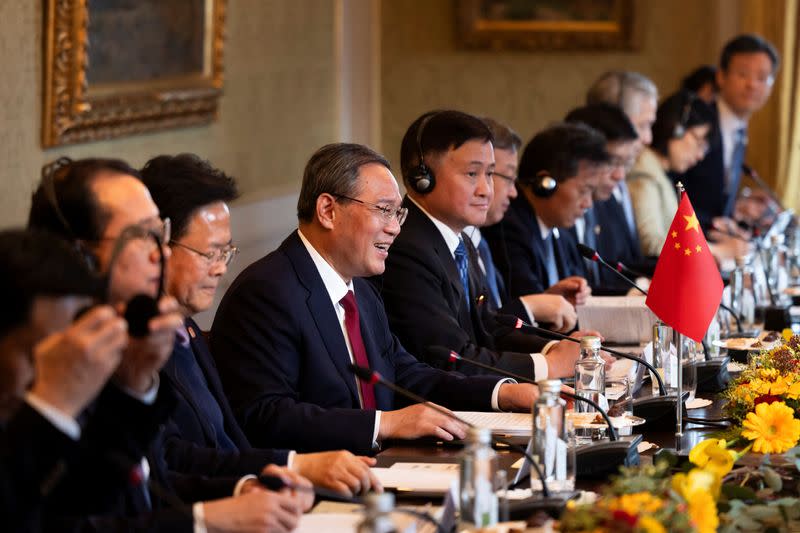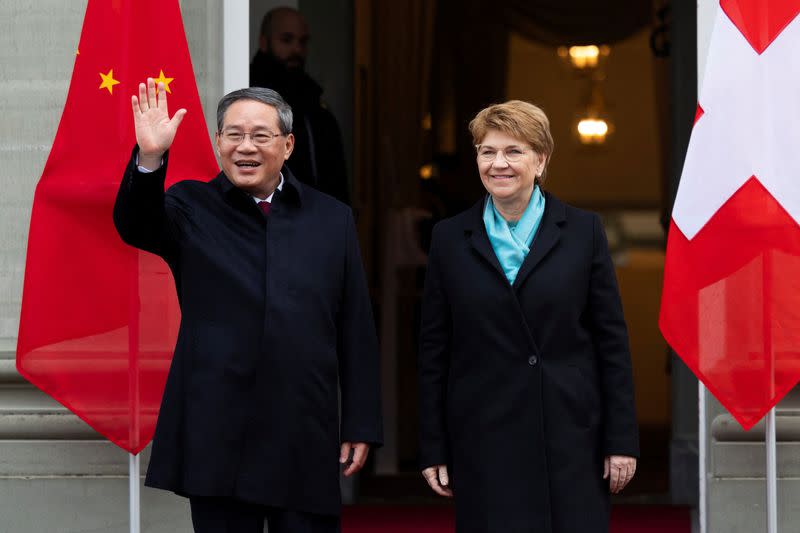China and Switzerland agreed on Monday to scale up economic ties after Chinese Premier Li Qiang met with the Swiss President.
The two countries signed a joint declaration on deepening their partnership after Li met President Viola Amherd, the Swiss government said.
Li, the most senior Chinese official to travel to Switzerland since a visit by President Xi Jinping in 2017, was accompanied by a high-ranking Chinese delegation ahead of the World Economic Forum in Davos.
ALSO SEE: North Korea Hackers Share Networks With SE Asia Crime Gangs
The declaration entails the finalisation of a joint study to develop the two countries’ existing free-trade agreement. “This marks an important step towards the start of possible negotiations,” the Swiss government said.
China is Switzerland’s third-biggest trading partner after the US and the European Union. The two countries signed a free-trade agreement in 2013, Beijing’s first such deal with an economy in continental Europe.
But efforts to refresh it previously stalled amid reports of concerns about China’s human rights record. A dialogue between the Swiss and Chinese foreign ministries will resume this year and is set to include human rights.
Li and Amherd, who met in an 18th century manor house near the capital Bern, also discussed Russia’s war against Ukraine and the Israel-Hamas conflict, the Swiss statement said.

Push for ‘win-win’ outcomes at World Economic Forum
The Chinese Premier will address global investors and politicians in Davos on Tuesday, as Beijing grapples with a sluggish post-pandemic recovery and a real estate slump.
His speech comes as, for the first time in the four decades since China opened up to foreign investment, overseas executives have grown concerned about its long-term growth prospects.
Li, who leads a large government delegation at this week’s World Economic Forum, is the most senior Chinese official to rub shoulders with global business and political elites at the Swiss ski resort of Davos since President Xi Jinping in 2017.
He would “promote global cooperation, address various risks, bridge the development divide, and seek peaceful coexistence and win-win outcomes”, Chinese state news agency Xinhua reported.
“China is generating a steady stream of growth momentum and potential for its economy,” Xinhua’s report added.
Li’s past overtures declaring China open for business have been met with scepticism in some boardrooms in light of a broader anti-espionage law, raids on consultancies and due diligence firms and exit bans, trade bodies say.
In addition, businesses have longstanding worries about geopolitics, tightening regulations and a more favourable playing field for state-owned companies. In the July-September quarter, China recorded the first quarterly deficit in foreign direct investment since records began in 1998.
Blinken, Zelenskiy also in Davos
WEF organisers said more than 2,800 leaders from 120 countries, including more than 60 heads of state, are due to participate at the annual meeting.
Chinese premiers have typically been responsible for overseeing the economy, but Xi has tightened his grip in recent years and steered it more directly in a statist direction.
Li, a career bureaucrat, was revealed as the pick for China’s No-2 role last October when Xi unveiled a leadership line-up stacked with loyalists.
Beyond the message on the economy, investors will be on the lookout for any bilateral meetings on the sidelines of the event, especially with Middle Eastern leaders and US Secretary of State Antony Blinken, who is also scheduled to attend.
China’s Foreign Minister Wang Yi called on Sunday for a larger, more authoritative Israeli-Palestinian peace conference and a timetable to implement a two-state solution as the Gaza conflict escalated and the Red Sea became a new flash point.
Also on Sunday, Ukrainian President Volodymyr Zelenskiy’s chief of staff said it was important that Russian ally China was present when Kyiv convenes future peace meetings, although no meeting between Li and Zelenskiy was on the official agenda.
- Reuters with additional editing by Jim Pollard
ALSO SEE:
Japanese Firms Gloomy on China’s 2024 Economic Prospects
Chinese Car Exports to EU Seen Hit by Red Sea Ship Attacks
China Sees First-Ever Foreign Investment Deficit in July-Sept
China Hit by Months of Plunging Foreign Investment – FT
EU Denies China Decoupling Plan But Admits ‘De-Risk’ Aim
























